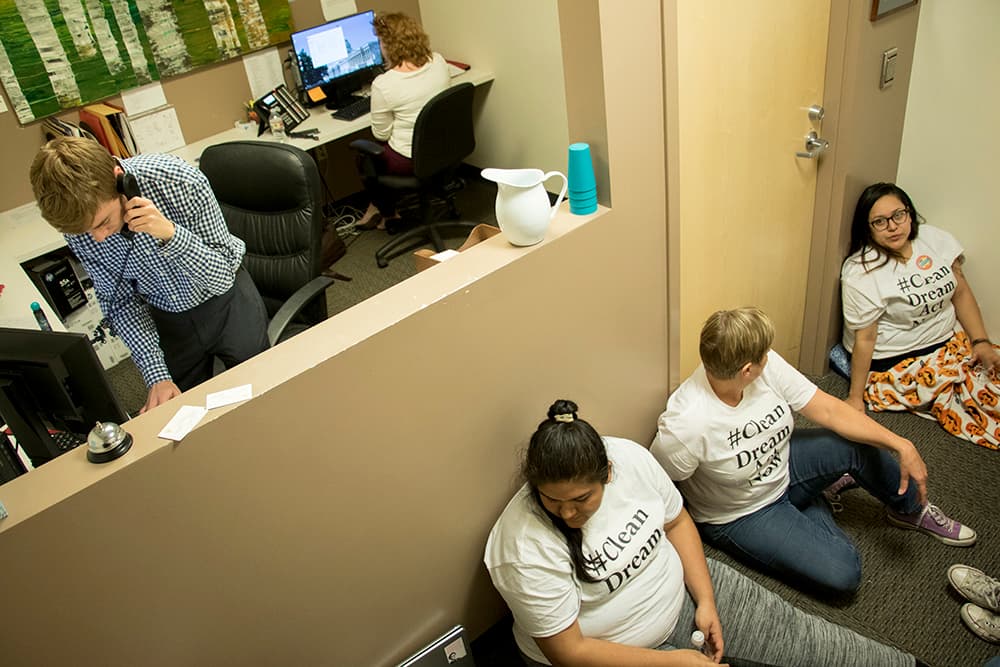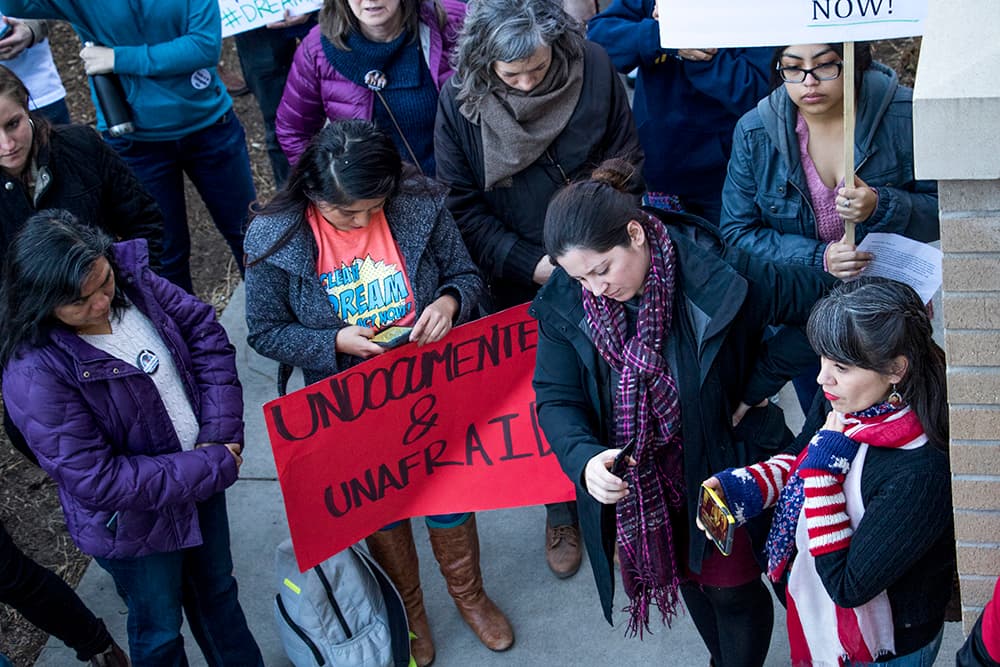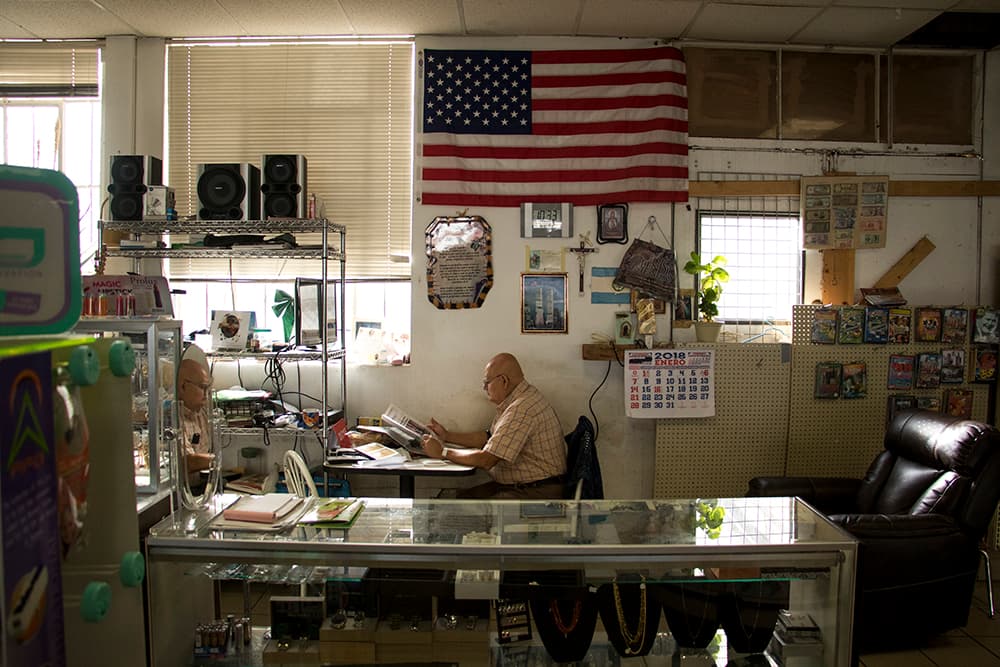
Jorge Velasquez already had a lot on his mind when he learned his legal status would be terminated. On top of having three kids to raise and the rising rent for his south Denver apartment, his wife, Araceli, had been living in sanctuary for months to avoid deportation.
The immigrant from El Salvador has been in the U.S. for over 20 years. Since 2001, Velasquez has lived and worked here legally under Temporary Protected Status (TPS), a case-by-case relief program that's usually invoked to help migrants fleeing natural disasters. It was enacted for Salvadorans by the Bush administration after a massive earthquake.
Last year, the Trump administration announced it would terminate the program. Velasquez is now faced with the possibility that he'll be forced to leave the country, or else live a shadowy existence in the U.S. without documentation.
"I don't even want to think about going back to El Salvador yet," Velasquez told Denverite through a translator. With raging gang violence and little economic opportunity back home, he said, it's simply not an option for him or his kids. Until his legal status is revoked in September of 2019, Velasquez says he and immigration activists have time to lobby Congress for a path to citizenship. But higher-profile immigration fights have so far overshadowed efforts to protect TPS holders.

So many issues, so little time
When six activists began camping out in Senator Michael Bennet's office in Denver this week, they made it clear that they hoped Bennet would push for a "clean DREAM act" as the Senate moves closer to debating immigration policy in Washington.
Much of that debate centers around status for young people brought into the country illegally as children and protected by Deferred Action for Childhood Arrivals act, the Obama-era executive order known as DACA that was cancelled last year.

The "clean" part of the activists' message refers to sweeping immigration reform that would include concessions for TPS holders. It's not just Salvadorans facing deadlines; the Department of Homeland Security also announced it will end the program for people from Haiti, Nicaragua and Sudan. Activists fear protections for six other countries could also be cancelled.
The occupiers managed to get Bennet on the phone, but he told them it would be too difficult to pass all of their demands through the Senate with Republicans helming the House, Senate and presidency.
"Because you are my constituents, I owe you the truth," he said. "In that kind of situation, there is no way that a clean DREAM act is going to pass."
Bennet has advocated to protect both DACA and TPS holders in the past, but folks like Velasquez say they're often left behind in the broader conversation. Much immigration media coverage and protests actions center around DACA recipients, known as dreamers.
Especially in Colorado, Velasquez said, there's a difference in focus within immigrants rights organizations. "I don't see that focus on all countries equally," he said.

Corrine Rivera-Fowler, director of policy & civic engagement for the advocacy group Padres & Jóvenes Unidos, told Denverite this disparity is due, in part, to the public's inability to wrap their heads around TPS issues.
"DACA has just gotten so much attention. You have a clearly identified group of people that lost their status on a date," she said outside of Bennet's office as the occupiers hunkered down to stay the night. "The general public supports at least a solution for the DREAMers. We haven’t seen that same solidarity around TPS because it’s such a complicated story."
Groups like Padres also have their hands full this year with a litany of issues to fight.
"I’ve been doing policy work for 13, 14 years. This year is the longest year of my life, and I’m not an affected community member," she said. Lately, she and her colleagues have felt pulled in every direction, "every day, every minute."

A fractured community makes advocacy difficult
On East Colfax, next to the trendy Bellwether coffeeshop, Jorge Romero and his wife, Delia, have run a Salvadoran grocery for more than 25 years. People come here from all over Colorado, Wyoming and Nebraska to buy cheeses and souvenirs that he imports from home. While Salvadorans live in tighter density on America's coasts, here, in the center of the country, his community is spread out.
Without geographic unity and now with precarious status, people mostly keep their heads down. Though he's used to helping people with personal business like sending money home and translating paperwork, he said, people don't always like to talk about their legal status. "They do and they don’t," he said. "They are afraid."

The Romeros are U.S. citizens (and proud of it, Jorge said), but a great many of their clientele are now on the ropes. Nationwide, the number of people affected is as high as 200,000. For Jorge and Araceli Velasquez, nearly everyone they know either has TPS or is related to someone who does.
"It’s not just me and my husband and my kids that are affected, but all of my family. My brothers, my uncles," Araceli Velasquez told Denverite though a translator. "Everybody that I know here for the most part has TPS."
Araceli does not have TPS, which is one reason she has been fighting deportation since last August.

But more pressing than her brother's or husband's fate, she said, is a future for her U.S. citizen children. What would happen to them if she and Jorge were deported?
Some estimates peg the number of citizen children of TPS-protected Salvadorans at 192,000.
In El Salvador, she said, "There’s no future for them there." Going there, to her, means they'll be kidnapped or forced to join a gang.
"If they’re here with their parents they have opportunities to be nurses, to be electricians, to be lawyers," she said. "The only thing that waits for them in my country is a lack of future or death."

While the Velasquezes see at least a yearlong runway ahead of them to lobby congress for a path to stay in the country, the Senate has begun debating sweeping immigration this week. Multiple proposals have been announced, including a bipartisan approach between Senators Bennet and Gardner. A spokesperson for Bennet said that TPS is not included in that proposal.











